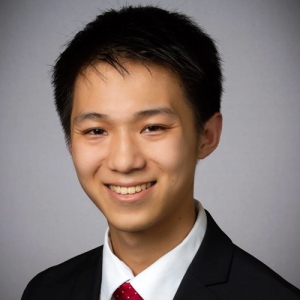Collaboration for Cancer Equity
February 24, 2023
Duke and Duke Kunshan students join forces to develop innovative tools for addressing cancer disparities in China

By Lily Neusaenger
Cancer is the world’s second leading cause of death, and China is not immune to this modern epidemic. In fact, about one in four newly diagnosed cases were in China according to 2020 data, which is a disproportionately large share. Yet there is a lack of comprehensive, accessible information concerning the country’s cancer prevention and control efforts.
One Bass Connections team — Digital Tools for Cancer Control Equity in China — set out to fill this information gap by designing an interactive, up-to-date website that can be used to understand China’s current cancer burden, disparities and practices.
Bringing Data to the Public and Decision-Makers
Duke undergraduate Charlie Zong who is currently studying philosophy, politics and economics, explained that the team is focusing on addressing the disparities between regions of China and population subgroups in cancer outcomes and control. “To understand these disparities better and to understand the policies that are in place to address those disparities, we’re using digital tools,” he said. “And by having these digital tools, we’re making these policies accessible to the people.”

The team’s major output will be a public website that “will host products like digital maps that people can interact with, databases and policy information,” Zong said, “and it will also serve as a forum for members of the public to talk more about their experiences dealing with cancer.”
The team is also working on research papers. “These papers are looking at how China defines equity and cancer control, and also which institutions are involved in cancer control and how they collaborate with one another,” Zong explained. Team members hope their outputs will inform policy and intervention development, ultimately reducing cancer burden and the disparities that currently exist.
Global Collaboration Across Campuses
Composed of students from both Duke University and Duke Kunshan University (located in mainland China), the Bass Connections team represents a collaboration across continents, cultures and time zones. This partnership proved to be a crucial factor in the development of the research project, particularly when it came to gathering data.
According to Zong, accessing digital data in China can be challenging. This led the team to pursue alternative sources such as interviews with patients and members of patient foundations and cancer control nonprofits. The ability to travel and meet with these stakeholders was made possible through the on-the-ground efforts of the Duke Kunshan students, highlighting the importance of collaboration in achieving the team’s research objectives.
Students from both campuses brought diverse and complementary skills to the table, enabling the team to conduct more efficient qualitative and quantitative research. For instance, some of the Duke Kunshan students had expertise in creating digital maps using geographic information systems (GIS) software, while some of the Duke students contributed knowledge of website development and embedding elements such as maps.
Navigating Challenges
Like any research project, this one encountered a few challenges along the way, including scheduling issues arising from the time zone difference between the two campuses, figuring out how to delegate responsibilities and the need to navigate cultural differences. Duke Kunshan’s academic semester is more condensed, leading to a preference for more frequent meetings among Duke Kunshan students, which differed from the work style of Duke students. While this process was not without its bumps, Zong noted that overall, “it was an educational experience for students to learn to work with people that are literally halfway around the world.”
The Duke Kunshan students’ expertise proved invaluable in helping the team better understand the intricate relationships between different institutions in China. Zong explained, “Duke Kunshan is a unique institution because it’s really a bridge between Chinese academia and academia in the U.S. and other parts of the world.” The team had to adapt to the fact that many of the norms they were accustomed to, such as widespread access to online data, did not necessarily apply to the research landscape in China. In this context, relationships play a significant role in determining access to data and other research resources, and the team learned that their status as undergraduates could sometimes be a limiting factor.”
As Zong concluded, “Just understanding that scale and respecting the priorities of these institutions and finding a mutually agreeable way to collaborate was in itself one of the major learning opportunities for those of us at Duke.”
Deepening Relationships, Forging New Collaborations
Zong is grateful for the interpersonal experience and lessons he learned on conducting research across institutional and geographic borders. “The person-to-person element is so valuable, and just being able to talk and work with [Duke Kunshan] students directly has been a very fulfilling personal experience for me,” he noted.
As a result of these relationships, Zong co-founded an interinstitutional student network, South-North Scholars, on international affairs and development. “It’s just one example of the kind of broader collaboration that can emerge from a research project on a specific topic like cancer control equity,” he said. He hopes the students from both campuses can eventually meet in person and that more research projects will feature robust partnerships between Duke and Duke Kunshan.
Boost From the UN
In addition to the benefits of collaboration across campuses, the team also received valuable resources and exposure for their project through the Millennium Fellowship. Sponsored by the United Nations agency UN Academic Impact, this fellowship supports a global network of students at around 200 universities, comprising approximately 3,000 individuals with a shared interest in issues aligned with the UN's Sustainable Development Goals. Both Duke and Duke Kunshan were selected as participating institutions, and Bass Connections team members from both campuses received fellowships. They will share their research findings and experiences with other fellows and UN staff members.

Zong hopes the added exposure will further the impact of the team’s work and help them reach a global audience.
Coming Up
The final stage of the team’s work is to publicize their website and papers and engage the public directly. They also hope to host a physical exhibit comprising a collection of stories and artwork from cancer patients where the patients talk about what cancer control equity means to them. These events will be hosted on both campuses, representing the team’s accomplishments and the international effort that was required to make them happen.
Learn More
- Read about this Bass Connections project team.
- Mark your calendar for the 2023 Fortin Foundation Bass Connections Showcase on April 19.
- See the Bass Connections call for proposals related to Duke’s centennial.
Lily Neusaenger ’25 is a content writer in the Office of the Provost. She is majoring in computer science with minors in statistical science and creative writing.
